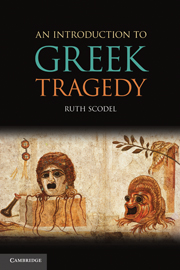8 - Medea
Published online by Cambridge University Press: 05 June 2012
Summary
Medea is a revenge tragedy. Euripides inherited a story in which Medea, the princess of Colchis (on the eastern shore of the Black Sea, in modern Georgia), fell in love with the hero, Jason, when he came to her country on his quest for the Golden Fleece. She used her knowledge of magic to help him with the ordeals set by her father, and when she fled with Jason and her father came in pursuit, she murdered her brother so that her father would be delayed picking up the mutilated pieces. When they returned to Iolchus, she took revenge on his enemy, Pelias, by convincing his daughters to cut him up as a way of renewing his youth. They fled to Corinth. There Jason abandoned Medea and her children to marry the princess, daughter of King Creon. Medea killed the princess and her father, and fled to Athens where she was received by King Aegeus. The Corinthians murdered the children of Jason and Medea, who later received a cult as heroes (see glossary) at the temple of Hera Akraia.
Scholars disagree about whether Euripides was the first tragedian to make Medea the killer of her own children. The hypothesis (see glossary) quotes Dicaearchus, a student of Aristotle, and Aristotle himself for the guess that Euripides took this element of the plot from Neophron, a very prolific (120 plays) but obscure tragedian.
- Type
- Chapter
- Information
- An Introduction to Greek Tragedy , pp. 120 - 132Publisher: Cambridge University PressPrint publication year: 2010



